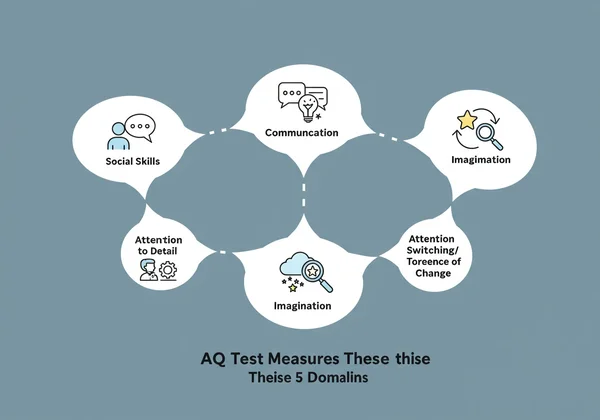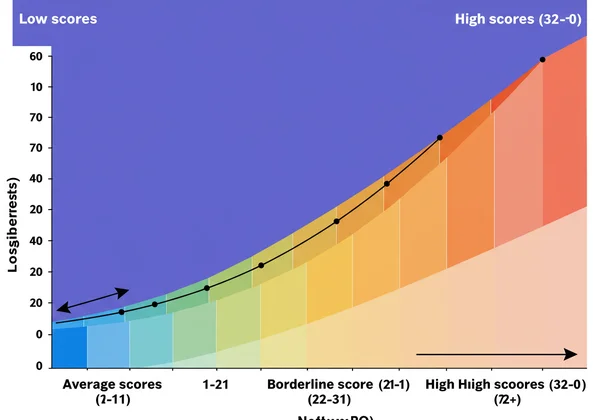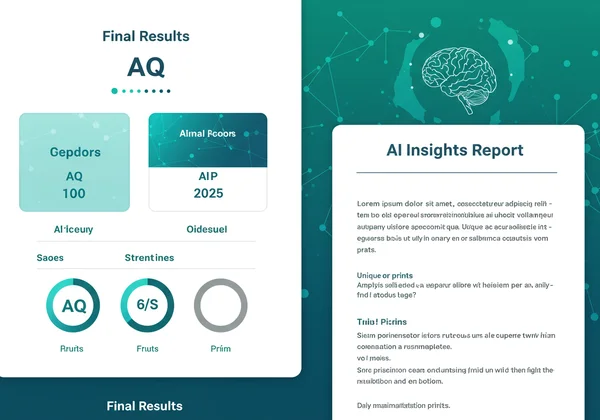The AQ Test: Your Ultimate Guide to Autism Quotient & Insights
September 29, 2025 | By Eliza Finch
Welcome to the ultimate guide on the Autism Quotient (AQ) test. Have you ever sensed you perceive the world a bit differently, or are you just curious about your unique traits? You're in the right place. Many wonder, what is my AQ score? This resource will demystify the AQ test, guiding you from its scientific roots to interpreting your results and exploring next steps. Self-exploration is a rewarding journey, and we're here to offer a clear, supportive roadmap.

At AQ Test, we believe that understanding yourself is the first step toward personal growth and well-being. Our goal is to provide a reliable tool for this discovery. You can begin this process today by taking a free online test on our platform.
What is the AQ Test? Unpacking the Basics
The Autism Quotient (AQ) test is a questionnaire designed to measure the extent to which an adult with normal intelligence has traits associated with the autism spectrum. It's a self-assessment tool consisting of 50 questions that explore your preferences and behaviors across several key areas of life. Developed by leading researchers, it has become one of the most widely recognized screening instruments for autistic traits.
The test isn't about passing or failing; it's about gaining insight. It serves as a starting point for individuals who are curious about their own neurotype. By providing a numerical score, it offers a structured way to reflect on personal characteristics that might otherwise be difficult to describe or quantify.
What Does the Autism Quotient Test Measure?
The AQ test is carefully structured to evaluate traits across five distinct domains. Each question contributes to your understanding of these core areas, providing a nuanced picture of your cognitive and behavioral style. These domains include:

- Social Skills: This area assesses your comfort and proficiency in social situations, such as understanding social cues or enjoying casual conversations.
- Communication: This dimension looks at your communication patterns, like whether you prefer direct, literal language or find it easy to grasp implied meanings.
- Imagination: This explores your ability to engage in imaginative play, storytelling, and seeing situations from other people's perspectives.
- Attention to Detail: This measures your focus on patterns, systems, and small details that others might overlook.
- Attention Switching/Tolerance of Change: This assesses how you handle changes in routine and your ability to transition between different tasks or topics.
Is the AQ Test a Diagnostic Tool for Autism?
This is a critically important point: the AQ test is not a diagnostic tool. It is a preliminary screening instrument designed to indicate the presence and degree of autistic traits. A high score suggests that you have a number of traits commonly found in autistic individuals, but it does not confirm an autism diagnosis.
Think of it as a helpful first step, not a final conclusion. A formal diagnosis can only be made by a qualified healthcare professional, such as a psychologist or psychiatrist, through a comprehensive clinical assessment. We strongly encourage using the AQ test as a source of information to better understand yourself or to facilitate a more informed conversation with a professional.
The History and Scientific Basis of the AQ Test
To trust a tool, it's essential to understand its origins. The AQ test isn't just a random online quiz; it's a product of rigorous academic research. Its credibility stems from a solid scientific foundation, making it a reliable instrument for self-exploration and preliminary screening.
The development of this questionnaire has been pivotal in how we understand and measure autistic traits in the general population. It has helped shift the conversation from a purely clinical perspective to one that embraces neurodiversity and a spectrum of human experience.
The Genesis: Simon Baron-Cohen and the AQ Questionnaire

The AQ test was developed in 2001 by a team of researchers at the University of Cambridge, led by Professor Simon Baron-Cohen. As a leading expert in the field of autism research, Baron-Cohen and his colleagues sought to create a standardized, self-administered measure to quantify autistic traits in adults.
Their work was published in the prestigious Journal of Autism and Developmental Disorders, providing a validated instrument for both clinical and research purposes. The questionnaire's creation was a significant milestone, offering an accessible way for individuals to explore characteristics associated with the autism spectrum. If you're ready to explore this tool, you can get your AQ score now.
Evolution and Recognition in Autism Research
Since its inception, the AQ test has been used in hundreds of scientific studies worldwide. Its reliability and validity have been consistently demonstrated across diverse populations. Researchers use it to better understand the cognitive profiles associated with autism and how these traits are distributed throughout the general population.
This widespread adoption in the scientific community underscores its value as a screening tool. Its continued use helps refine our understanding of neurodiversity and supports the idea that autistic traits exist on a continuum.
Interpreting Your AQ Score: The Five Dimensions Explained
Receiving your AQ score is just the beginning. The real value lies in understanding what that number represents and how it relates to your lived experience. Your score is a data point, a piece of a much larger puzzle that is uniquely you.
It’s important to approach your score with curiosity rather than judgment. Whether your score is high, low, or somewhere in the middle, it provides a framework for reflecting on your strengths, challenges, and preferences. You can discover your results quickly and confidentially on our platform.
What Do High, Average, and Low AQ Scores Indicate?

The AQ test is scored out of a maximum of 50. While there are no strict "cut-offs," general guidelines can help you interpret your score:
- Low Scores (Typically 0-10): Indicate very few autistic traits.
- Average Scores (Typically 11-21): Reflect a typical number of traits found in the general population.
- Borderline Scores (Typically 22-31): Suggest a higher than average number of autistic traits.
- High Scores (Typically 32 and above): Research suggests that around 80% of autistic adults score in this range, indicating a significant number of autistic traits.
Remember, these are just guidelines. Your score is a personal insight, not a label.
The Five Core Areas Assessed by the AQ Test
As mentioned earlier, your total score is a composite of five subscales. Understanding how you score in each of these areas can provide even deeper insights:
- Social Skills: A higher score here might mean you find small talk challenging or prefer interacting in smaller, more structured settings.
- Communication: This could reflect a preference for clear, unambiguous language and potential difficulty reading between the lines.
- Imagination: A higher score may indicate a more practical and factual thinking style rather than a focus on fiction or make-believe.
- Attention to Detail: This often points to a strength in recognizing patterns, facts, and details that others may miss.
- Attention Switching: A high score here might suggest a preference for routine and difficulty with unexpected changes or multitasking.
Taking the AQ Test Online: A Step-by-Step Guide
Getting started on your journey of self-discovery is simple, confidential, and completely free. Our platform is designed to provide you with a seamless and supportive experience from start to finish. We believe everyone should have access to tools that can foster self-awareness.
Taking an adult autism test online allows you to explore these questions in a private, pressure-free environment. In just a few minutes, you can gain valuable insights that may help you understand years of personal experiences.
How to Take the AQ Test Online for Free
Taking the test on our website is straightforward. Simply visit our homepage and click "Start Free AQ Test." You will be presented with the 50 standard questions. Answer them honestly based on how you truly feel or behave. There are no right or wrong answers—only your personal experience matters. Once you complete the questionnaire, your AQ score will be calculated and displayed instantly.
Your AQ Score & Beyond: Getting Personalized AI Insights
While other platforms stop at the score, we go a step further. After receiving your initial result, you have the unique option to answer a few additional background questions. By doing so, you can unlock a personalized, in-depth analysis report generated by our advanced AI.

This report moves beyond a single number. It translates your score into meaningful insights about your unique strengths, potential challenges, and how your traits might manifest in daily life. It also provides actionable suggestions for personal growth, making it a truly valuable tool for self-development. You can explore your traits with this powerful feature.
What to Do After Getting Your AQ Score
Your score is a starting point. If your result resonates with you and you wish to explore it further, you might consider several next steps. You could read more about the experiences of neurodivergent individuals, connect with online communities for support, or discuss your results with a trusted friend or family member.
If you are seeking a formal diagnosis, the next step would be to consult with a qualified healthcare professional. You can bring your test results and AI report as a helpful starting point for that conversation.
AQ Test Accuracy & Limitations: What You Need to Know
Transparency is crucial for building trust. While the AQ test is a scientifically validated and reliable screening tool, it's important to be aware of its capabilities and limitations. Understanding this context ensures you can use the information you receive in the most effective and healthy way.
We are committed to providing you with accurate information so you can make informed decisions about your well-being. Our online screening tool is designed with this principle of transparency at its core.
How Reliable and Valid is the AQ Test?
The AQ test has demonstrated good reliability and validity in numerous research studies. This means it consistently measures what it's intended to measure (autistic traits) and produces stable results over time. Its ability to differentiate between autistic and non-autistic groups in research settings is well-established.
However, its accuracy as a screening tool for individuals can be influenced by factors like co-occurring conditions (e.g., ADHD, anxiety) and a person's level of self-awareness.
AQ Test vs. Clinical Diagnosis: Understanding the Difference
It's essential to reiterate the difference. The AQ test is a self-report questionnaire that provides an indication of traits. A clinical diagnosis, on the other hand, is a comprehensive evaluation conducted by a trained professional. This process typically involves detailed interviews about your developmental history, direct observation of social and communication behaviors, and potentially input from family members. The test is a signpost; a diagnosis is the destination reached with a professional guide.
Ready for Your Journey of Self-Discovery?
Embarking on a path of self-discovery is a powerful act. The AQ test offers a structured way to explore your unique cognitive and behavioral landscape, providing a language and framework to understand experiences that may have been hard to articulate. It's more than just a score—it's a mirror for self-reflection and a compass for your journey.
Are you ready to gain deeper insight into your personal traits and understand yourself better?
Take the first step on your path to greater self-awareness. Start your free, confidential AQ test today and unlock your optional AI-powered personalized report.
Frequently Asked Questions About the AQ Test
What is the AQ test and what does it measure? The Autism Quotient (AQ) test is a 50-question self-assessment that measures the degree of autistic traits in an adult. It assesses five key areas: social skills, communication, imagination, attention to detail, and attention switching. It provides a numerical score to help you understand your personal profile.
How accurate is the AQ test? The AQ test is a scientifically validated screening tool with good reliability. Studies show it is effective at identifying autistic traits. However, it is not a diagnostic instrument, and its accuracy can be influenced by individual factors. For a definitive answer, a clinical assessment is necessary.
What does a high AQ test score mean? A high score (typically 32 or above) indicates that you possess a significant number of traits commonly associated with autism. It suggests that further exploration or a conversation with a healthcare professional may be beneficial. You can get a free test on our website to see your score.
Is the AQ test a diagnosis for autism? No, absolutely not. The AQ test is a screening tool, not a diagnostic one. It can indicate the presence of autistic traits but cannot provide a formal diagnosis. Only a qualified healthcare professional can conduct the comprehensive assessment required for an official diagnosis.
What should I do after getting my AQ score? After getting your score, take time to reflect on it. Our optional AI-powered report can provide deeper, personalized insights. Depending on your results and feelings, you might choose to learn more about neurodiversity, connect with community groups, or consult a professional for a formal evaluation.